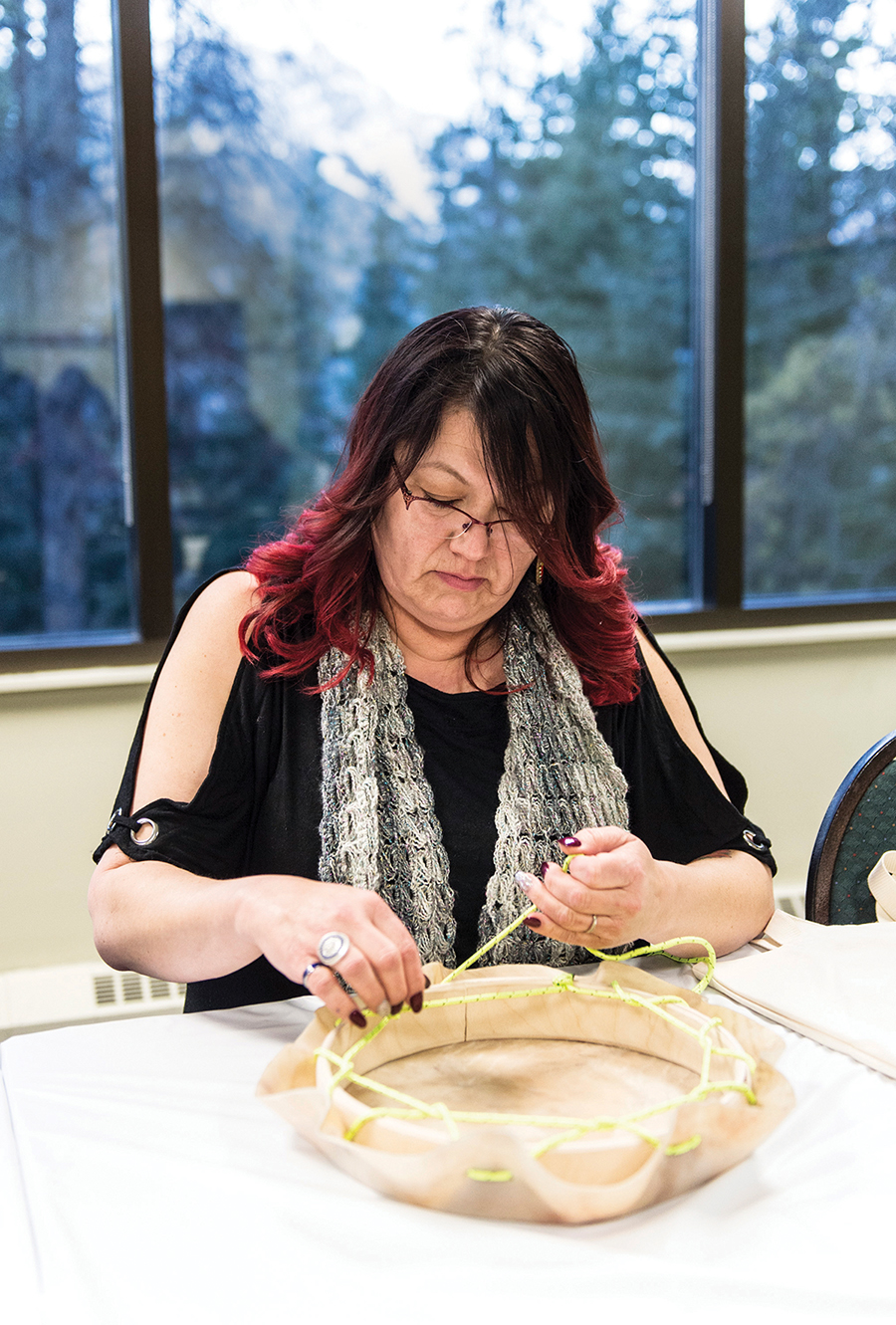Building Blocks

Angie Prince-Smoke in an Indigenous Leadership program at Banff Centre. Photo by Rita Taylor.
This article originally appeared in the 2018-19 issue of Buffalo Mountain Drum magazine. Pick up a copy on campus.
Angie Prince-Smoke was raised in Long Plain First Nation, Manitoba, just southwest of Portage la Prairie. Her grandfather was a First Nations politician who served throughout Manitoba — he was an advocate for education, and if he ever saw Angie on
a school day he would ask: “Why are you home? Go to school,” she remembers.
“For First Nations, I’ve learned that education is power.”
But she didn’t always feel that way. As Angie puts it, “I was a reserve kid with an attitude. I had a big chip on my shoulder.” In high school, she carried that chip with her on the bus every morning to Portage la Prairie — off reserve. “I was stubborn back then. I didn’t care if you were the teacher, or the principal. I carried that chip around for 30 years of my life.”
She struggled to find the right education program. Her mother had gone to university and her father to trades college, but after two years of Angie’s Bachelor of Education, she decided it wasn’t quite the right fit. Plus, she and her husband were starting a family, and by the time she was 30, she was raising two children.
Angie’s father, meanwhile, was working for the Dakota Ojibway Tribal Council, and he was encouraged by the Council to seek out professional development opportunities. That was how he came to attend Banff Centre’s Indigenous Leadership programs, where he earned a Certificate of Indigenous Leadership, Governance, and Management Excellence. The certificate is awarded to individuals who successfully complete a total of seven programs; three compulsory and four optional.
Inspired by her grandfather’s words and her mother and father’s pursuits, Angie never gave up on the concept of formal education. She completed a Business Administration Certificate at Yellowquill College, a certificate for Certified Aboriginal Financial Manager, and a diploma in First Nation Management and Administration. By the time she graduated in 2015, she’d already been hired by Ginew Housing Authority Inc. in Roseau River First Nation to manage its urban rental properties.
A year into the new job, Angie helped Ginew launch a new initiative: The First Time Home Ownership Program, focused on aiding Rosseau River band members to buy homes off the reserve. The idea was to allow qualifying Indigenous workers a way to afford homes that were close to where they needed to live and work, by giving them support and assisting with the money for a down payment. Since 2016, eight Roseau River band members have bought houses with the assistance of the program.
At Ginew, Angie was asked by the board to explore professional development opportunities, so she started looking around at options. Then: “A light bulb went on. Banff Centre,” she said. “Because of my dad’s experience.”
Within the last year and a half, Angie has already completed three programs toward her own certificate, including Indigenous Women in Leadership, which had a profound impact on her. “This experience helped me let go of the negativity in life, and to become a better human. It was tough, but it was an awakening. We’re all evolving, all the time, and I feel like Women in Leadership sped up that process for me,” she says. “A lot of the people I met during the program were my peers, and we shared a drive and similar desires. We were from coast to coast, so our cultures were extremely different,” she remembers. “So, we’re all learning about different cultures, networking, and building relationships.”
“I try to be a role model, especially for my daughter and nieces. As First Nations women, we have a certain image that is put upon us, and, a lot of the time, we just accept it."
"That’s why I had an attitude all those years, and that chip on my shoulder. This program has changed the way I see things, and embrace things in my life,” she explains. “I’ve always been open, but I was still shy,” she smiles. “Now, I’m less shy — and no chip on the shoulder.”
Angie is a recipient of the Indigenous Woman’s Achievement inCommunity Leadership Award at Banff Centre.